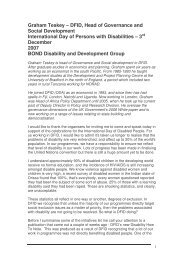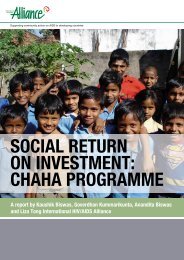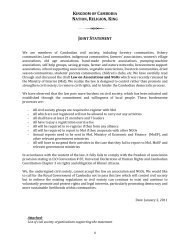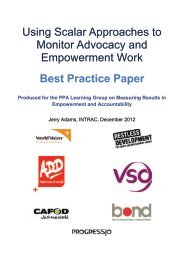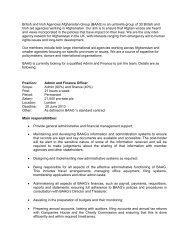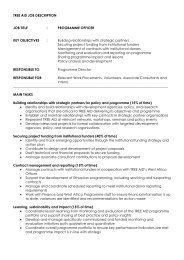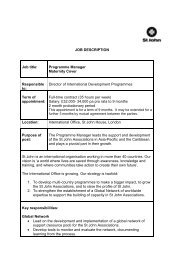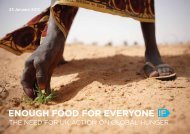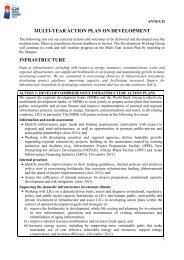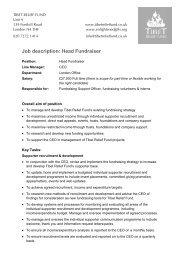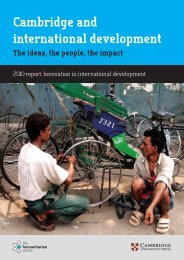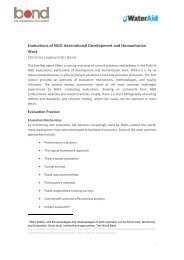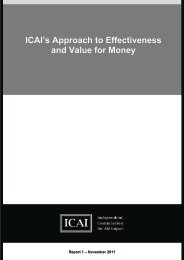Here - Bond
Here - Bond
Here - Bond
- No tags were found...
You also want an ePaper? Increase the reach of your titles
YUMPU automatically turns print PDFs into web optimized ePapers that Google loves.
Feature | Aid: Beyond the headlinesFeature | EU aid funding24 25AidBeyond the headlinesDoes moving away from stories of starvingchildren pose too big a risk to internationalNGOs’ income, or could a new approach kickstart a whole new era of public support?The UK public are tired of hearing the‘same old story since Live Aid’ aboutdesperate need in developing countries,according to new research, Where dowe go from here? Public attitudes todevelopment and joint campaigning, bythink tanks ODI and IPPR. The effect ofimages of starving people on thedevelopment process itself has longcaused disagreement within aidagencies because while shockingimages raise life-saving funds to carryout aid and development work, manybelieve they also reinforce perceptionsof people living in poverty as helplessvictims.This kind of messaging is seen notonly to perpetuate the idea that‘nothing has changed’, but alsoemphasises a sense of ‘them’ and ‘us’.Both outcomes are believed by many toprevent a meaningful shift in themindset of the UK public towards adeeper understanding of theinterconnectedness of all globalcommunities, the need to take actionas well as to give and ultimately, the endof extreme poverty.The IPPR/ODI research affirmed agrowing will within the aid anddevelopment sector to shift publicperceptions by painting a different andmore complex picture of progress.“Members of the public told us theywant to understand what progress hasbeen made as a result of aid anddevelopment work, even if the problemhas not yet gone away,” explained LeniWild of ODI, one of the research team.“They don’t necessarily believe a storyif it is too simple.”Is the aid and development sectorready to change the way the aid anddevelopment story is told and is theUK public really ready to hear it?Changing publicopinion is possibleIn late 2012, NGO representatives cametogether to discuss the researchfindings and further develop practicalways to collectively move the story on.It was agreed that while public opinionwill not change overnight, throughjoint, consistent and long-termmessaging, change could happen.Five things to start doing:1Find ways of telling stories that aretangible but not over-simplified.Emphasise the difference made bypublic donations. Include facts, do notassume knowledge and provide a hookon which audiences can engage.2During times when shockingimages are inevitable and relevant,aid agency spokespeople should framethe immediate crisis in the context ofwider issues and progress.3Think about packaging. Be creativein telling stories of success andprogress, using unexpectedspokespeople, positive stereotypes,strong metaphors and relevantemotional emphasis.4Reduce the perception of ‘us’ and‘them’ and emphasise the sense ofthe world’s interconnectedness.5Get to know audiences’ attitudesand behaviours and help to increasetheir understanding of what we aretrying to do and what impact they havehelped achieve.More research neededHowever, Jennifer Hudson of UCLwarned of the need to exercise caution,“We need a strong evidence base ofreactions to different possible messagesbefore assuming a new approach willwork.”Joe Twyman from the pollsterYouGov highlighted the complex andoften contradictory relationshipbetween people’s attitudes and theirbehaviour. Previous YouGov surveyshave found a sense of morality and anunderstanding of both the cost andbenefit of giving aid to individuals and/or the UK as a whole were the strongestdrivers for people approving of aid.“But while people may say “I thinkaid is important”, the way they act doesnot demonstrate this,”Joe said. “Theymay well not donate regularly and theymay well think the UK government isspending too much on aid.”Glen Tarman of <strong>Bond</strong> added that wecan improve the way we measureattitudes and analyse how this affectsaction. “We need to work out how tomonitor changes better so that we canreact to them well and nurture moreaction and deeper engagement insupport of our cause and politicalgoals.”To get a more meaningfulunderstanding of our audiences, thekey is to ask the right questions andalso to fill in the gaps in availableresearch to form a shared baseline ofpublic opinion.<strong>Bond</strong>’s public supportprogramme<strong>Bond</strong> is furthering these discussions bybringing NGOs together with the aim ofcreating a powerful new developmentnarrative and a common vision for theoptimum level of support forinternational development in the UK.As part of this work, <strong>Bond</strong> has compileda comprehensive online resource ofpolls and surveys on public opinion anddevelopment.Find out more and get involved:bond.org.uk/pages/public-support.htmladvocacy@bond.org.ukTara Burke, Freelance communicationsconsultantEU aid funding to2020 in ‘collateraldamage’ riskCrucial negotiations on the EU development andhumanitarian aid budget for the next seven yearswill take place in February 2013, and the stakescouldn’t be higher.Heads of state from the EU’s 27 countriesare set to meet 7-8 February 2013 todiscuss the Union’s MultiannualFinancial Framework (MFF), and theproposals that the EuropeanCommission had put forward in 2011.This framework – the seven-year EUBudget – will decide the Union’s overallspending, and within this, how muchmoney will be available for developmentand humanitarian aid from 2014 to2020.Summit fails tocome to agreementThe previous European Council headsof state summit in November 2012 brokeoff with no agreement. Herman VanRompuy, the president of the EuropeanCouncil, whose role is to chair meetingsand drive negotiations forward, foundhimself having to satisfy the needs ofcountries such as the UK and otherswhich were asking for very large cutsto the overall MFF to reflect austeritymeasures back home. All this whilstkeeping on board countries such asFrance – which do not want cuts to theCommon Agricultural Policy – andother countries that defended “cohesionspending” meant to stimulateeconomies in the poorer parts of the EU.Developmentaid sacrificedExternal spending (includingdevelopment aid) – which has so far nothad a group of countries standing up forit – quickly became the target of majorcuts. While no country openly stated itsdesire to reduce development andhumanitarian aid, this relatively smallpart of the overall MFF became a victimof ‘collateral damage’ as no agreementcould be found to sacrifice other partsof the Budget. During the Novembersummit, Van Rompuy thereforeproposed cutting the amount requestedby the European Commission for EUexternal spending by 13 per cent, as wellas a reduction to the EuropeanDevelopment Fund by 11 per cent.These were by far the most drastic cutscompared to any other policy areafinanced by the EU budget.If Van Rompuy’s proposals were tobecome the starting point for the nextnegotiations, and no coalition ofcountries emerges to defenddevelopment and humanitarian aid,EU development and humanitarianfunding levels are likely to suffer quitedrastic cuts. Many argue this wouldmake it very hard for the EU to reach itsstated 0.7 per cent goal, unless thereduction in planned EU level aidspending was compensated by anincrease in bilateral aid spending byindividual member states – which goesagainst current trends. While Sweden,Luxembourg and Denmark have alreadyreached the 0.7 per cent goal, and the UKis on its way to reach it, other countriesare lagging behind.Against this background, theEuropean Commission’s originalproposals were considered by NGOsand others as a realistic plan to putEurope back on track in reaching itscollective 0.7 per cent target. In addition,contrary to other policy areas, the EUexternal actions have been chronicallyunder-resourced and the current MFFnegotiations would in theory representthe best opportunity to fix that problem.<strong>Bond</strong> demands UKleadershipAhead of the November summit, <strong>Bond</strong>coordinated a letter signed by 25 of itsmember organisations to the PrimeMinister, and signed a separateCONCORD letter for other heads of EUstates which are on track with the 0.7per cent commitment. In the letter toCameron, we asked him to showleadership in Europe by protecting theproposed budget for development andhumanitarian aid. While recognisingthe background for the government’sposition of a no above-inflation rise tothe overall MFF, we have urged Cameronto ensure cuts to MFF spending do nothappen at the expense of the world'spoorest people.Restating our caseAhead of the next summit in February2013, we will reiterate these requests. Inparticular, we want UK and EU leadersto defend the Commission’s proposal toallocate €60 billion for development aid,including €21 billion for theDevelopment Cooperation Instrument,€30 billion for the EuropeanDevelopment Fund and €9 billion forhumanitarian aid. Crucially, this willhave no additional cost to the UKtaxpayer as it will count towards theexisting 0.7 per cent target. However,a higher EU aid budget commitmentwill mean other countries – particularlythose that are off track – will beencouraged to meet their aidcommitments too.Germana Canzi, EU Policy Adviser,<strong>Bond</strong>bond.org.uk/europethe networker 103 | January – March 2013 bond.org.uk bond.org.ukthe networker 103 | January – March 2013



